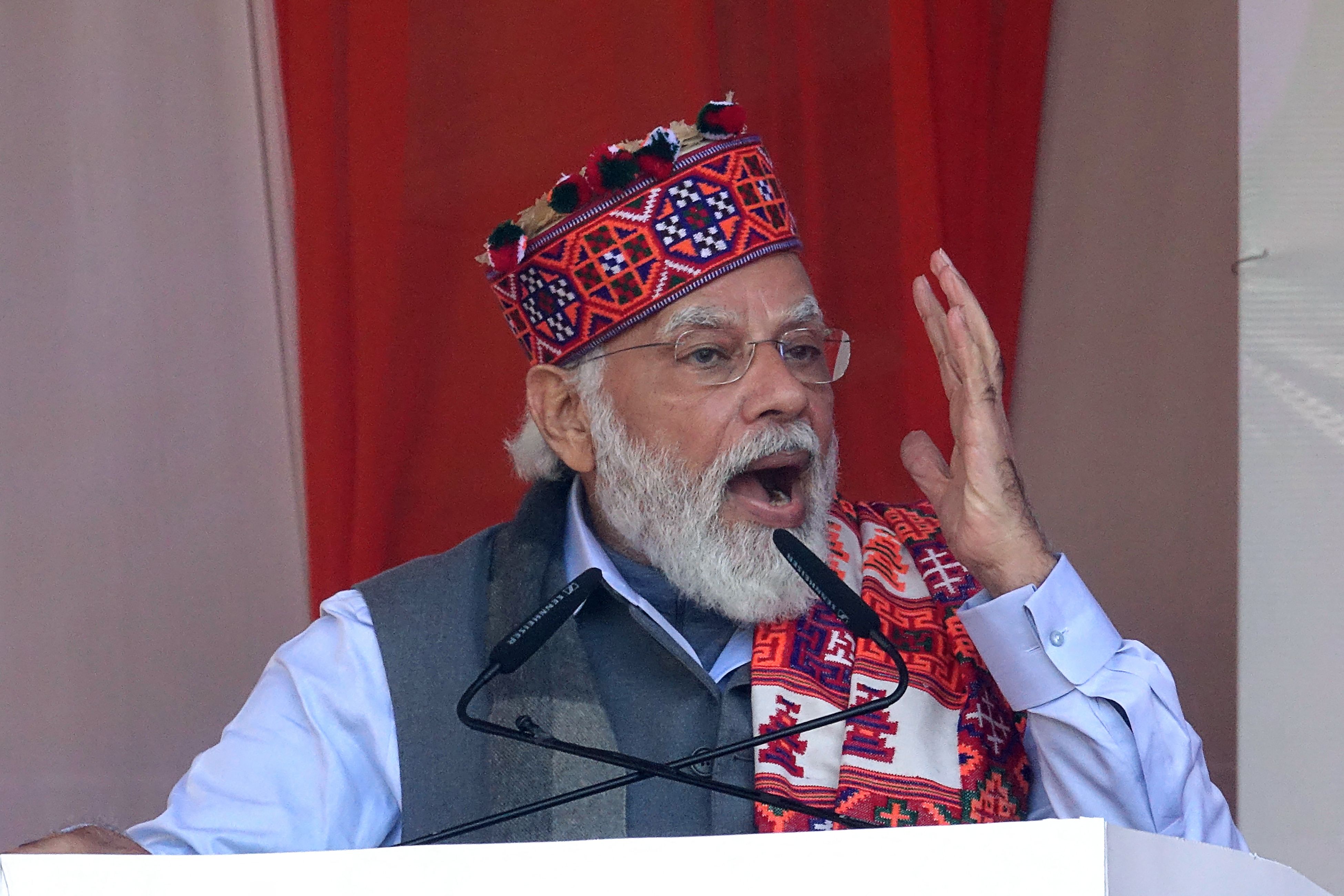India's Modi braces for tough local elections amid coronavirus surge
Sign up now: Get insights on Asia's fast-moving developments

Indian Prime Minister Narendra Modi's government is grappling with high unemployment and soaring food costs as a third Covid-19 wave emerges.
PHOTO: AFP
Follow topic:
NEW DELHI (BLOOMBERG) - Indian voters will head to the polls in several states in February and March, posing a key test for Prime Minister Narendra Modi, whose government is grappling with high unemployment and soaring food costs as a third Covid-19 wave emerges.
Local polls in the states of Uttar Pradesh, Punjab, Uttarakhand, Goa and Manipur will be a crucial indicator of sentiment ahead of the 2024 general elections.
Mr Modi's Bharatiya Janata Party (BJP) controls four out of the five states and a weaker showing this time could see the Prime Minister make concessions to different voter groups to secure a third consecutive term in the federal elections.
The most crucial is Uttar Pradesh, which accounts for about 17 per cent of India's voters. Mr Modi has spent a significant time in the state in recent weeks, from inaugurating projects to holding rallies that focus on winning over women voters and farmers.
"The BJP swept that state in 2017, which contributed to building its image of electoral invincibility. Losing ground in Uttar Pradesh now would automatically make the 2024 election more open and competitive," said Dr Gilles Verniers, assistant professor of political science at Ashoka University.
Opinion surveys predict closely fought victories for the BJP in Uttar Pradesh and three other states while Punjab, controlled by the main opposition Congress party, is expected to head towards a hung assembly.
These five states would contribute nearly a fifth of the Parliament seats when the 2024 election comes around.
If the BJP maintains or exceeds its 2017 performance in Uttar Pradesh, Mr Modi's hand will be strengthened in pushing through contentious labour reforms and privatising power distribution companies.
A slim victory or an outright loss could lead to delays in these reforms and a refocus on populist measures like providing more houses to the poor.
"The loss would probably bring back the same strategy they followed when they lost Madhya Pradesh and Rajasthan, where rural and semi-rural centric development and populist policies took precedence over a strategy of working on a long-term growth agenda," said Ms Madhavi Arora, an economist at Emkay Global Financial Services.
Voting in Uttar Pradesh, with a population almost equal to Brazil, will be held in seven phases starting on Feb 10 and ending on March 7, Mr Sushil Chandra, India's chief election commissioner, said on Saturday (Jan 8). Voting in Punjab, Uttarakhand and Goa will take place on Feb 14.
Vote counting for all the states will be on March 10, with results due the same day. The election commission has banned rallies and roadshows through to Jan 15 and asked political parties to focus on campaigning online.
India is seeing a surge in new Covid-19 cases, with 117,100 new infections reported last Friday, and there are instances of possible community spread of the Omicron variant.
India's ferocious second wave last year, which saw cases cross 400,000 a day at its peak and overwhelm hospitals and crematoriums, partly led to the BJP losing the state election in West Bengal last May.
Mr Modi saw his popularity dip last year. It appears to be tied to growing unemployment, which rose to a four-month high in December.
Coupled with accelerating inflation and restrictions by local governments to contain virus cases, these factors pose a risk to India's economy and Mr Modi's election showing.
This is reflected in Uttar Pradesh, a rural state with a young population that is dealing with rising joblessness and lower rural wages at a time when food and fuel costs are increasing. Along with Punjab, the state was home to the farmers' year-long protest movement against Mr Modi's agriculture reform laws.
Mr Modi has since repealed those laws in his biggest policy U-turn since taking office and protests ended last month, but the BJP still has to win over farmers who are looking for higher support prices for more crops. That will be a key challenge in holding on to Uttar Pradesh.
"It's a hard task for Modi. He can't afford to leave any stone unturned to retain power in Uttar Pradesh," said Mr Satish Misra, a New Delhi-based independent political analyst. "If he fails, 2024 will be much more challenging for him."

